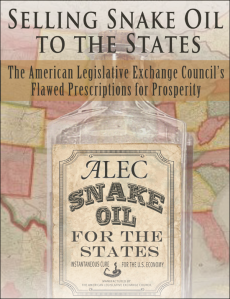Bad math: Corporate lobbyists, conservative think tanks hawk snake-oil economics for WA
Economist Arthur Laffer is touted as a go-to source of wisdom by conservative think tanks and corporate lobby groups in Washington state like the Washington Policy Center, Evergreen Freedom Foundation, National Federation of Independent Businesses, and Association of Washington Business. But a recent report shows Laffer’s economic prescriptions are more likely to hurt than heal our economy.
This year marks the fifth anniversary of Rich States, Poor States: ALEC-Laffer State Economic Competitiveness Index. Written by Arthur Laffer and others and published by the American Legislative Exchange Council (ALEC), Rich States, Poor States embodies the policy agenda that ALEC pushes to state legislators: reduction or abolition of progressive taxes, fewer investments in education and other public services, a smaller social safety net, and weaker or non-existent unions. These are the policies, ALEC claims, that promote economic growth.
But a hard look at the actual data finds that the ALEC-Laffer recommendations not only fail to predict positive results for state economies – the policies they endorse actually forecast worse state outcomes for job creation and paychecks. That is, states that were rated higher on ALEC’s Economic Outlook Ranking in 2007, based on 15 “fiscal and regulatory policy variables,†have actually been doing worse economically in the years since, while the less a state conformed with ALEC policies the better off it was.
That is true whether the outcome is growth in jobs or growth in per capita or median income. There is virtually no relationship between the ALEC ranking and state Gross Domestic Product (GDP). Further examination of the predictive power of other key components of ALEC’s rankings (income tax rates, existence of an estate tax, overall tax levels, right-towork status) shows that none had a statistically significant effect on growth in state GDP, non-farm employment, or per capita income.
Further analysis finds that key ALEC-Laffer claims contradict longstanding peer-reviewed academic research on how state economies grow:
- ALEC-Laffer claim that lowering state and local taxes produces much greater job growth; in actuality, such taxes are such a tiny cost factor for businesses, and come with higher taxes on others or lower quality public services, that such a strategy fails (see Chapter 3).
- ALEC-Laffer claim that a low top personal income tax rate is a key to small business success; in actuality, property and sales taxes – ignored by ALEC-Laffer – are far more important issues (see Chapter 1).
- ALEC-Laffer claim that high top personal income tax rates and the presence of estate and inheritance taxes cause large-scale out-migration of high-income individuals; in reality, migration has little to do with taxes, and there is no plausible case for state estate taxes affecting job-creating investment (see Chapters 3 and 4).
- The ALEC report asserts that state tax rates in many instances approach “Laffer Curve†territory, where tax cuts would actually increase tax revenue; in reality, tax cuts reduce revenue and result in the defunding of public goods such as education and infrastructure, which really do matter for economic development (see Chapter 5).
- ALEC-Laffer claim that wage suppression policies (anti-union “right-to- work†laws and the lack of a state minimum wage law) lead to greater job creation and prosperity; in actuality, such laws reduce wages and benefits but have little to no effect on job growth (see Chapter 6).
Overall, Rich States, Poor States consistently ignores decades of published research, making broad, unsubstantiated claims and often using anecdotes or spurious two-factor correlations that fail to control for obviously relevant factors. Indeed, the report repeatedly engages in methodologically primitive analysis that any college student taking Statistics 101 would be taught to avoid.
Consensus academic research derives far more plausible explanations for recent differences in state results. For example, instead of ALEC’s extreme policy recommendations, the composition of a state’s economy – whether it has large or small shares of the nation’s fastest-growing industries – is a far better predictor of job and income growth.
The evidence cited to support Rich States, Poor States’ policy menu ranges from deeply flawed to nonexistent. Subjected to scrutiny, these policies are revealed to explain nothing about why some states have created more jobs or enjoyed higher income growth than others over the past five years.
In actuality, Rich States, Poor States provides a recipe for economic inequality, wage suppression, and stagnant incomes, and for depriving state and local governments of the revenue needed to maintain the public infrastructure and education systems that are the true foundations of long term economic growth and shared prosperity.
Click here to read the full report “Selling Snake Oil to the States: The American Legislative Exchange Council’s Flawed Prescriptions for Prosperity†from Good Jobs First and the Iowa Policy Project.
Originally published at Washington Policy Watch.

